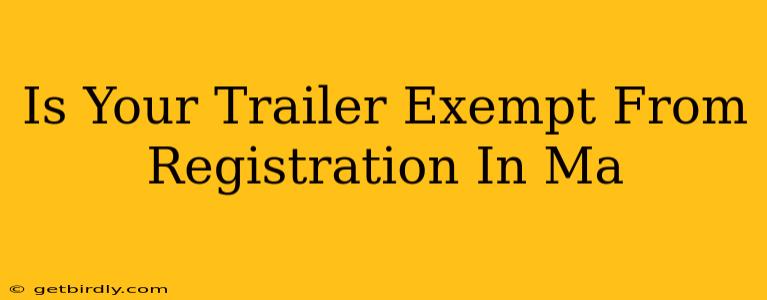Is Your Trailer Exempt from Registration in MA?
Massachusetts trailer registration laws can be confusing. Many people wonder if their trailer needs to be registered, and under what circumstances it might be exempt. This comprehensive guide will clarify the rules and help you determine if your trailer requires registration in the Bay State.
The short answer is: not all trailers require registration in Massachusetts. Whether your trailer is exempt depends on several factors, primarily its weight and intended use. Let's break down the specifics.
What Trailers Require Registration in MA?
In Massachusetts, trailers generally require registration if they meet both of the following criteria:
- Weight: The trailer's gross weight (GVWR – Gross Vehicle Weight Rating) exceeds 3,000 pounds. This is the maximum weight the trailer is designed to carry, including its own weight. You can usually find the GVWR on a sticker or plate affixed to the trailer.
- Use: The trailer is used for purposes other than certain specified exemptions (detailed below).
Failure to register a trailer that requires registration can result in fines and penalties.
What Trailers Are Exempt from Registration in MA?
Several types of trailers are exempt from registration in Massachusetts. These exemptions are crucial to understand to avoid unnecessary registration fees and paperwork. Here's a breakdown:
1. Trailers Under 3,000 lbs GVWR
As mentioned above, trailers with a GVWR of 3,000 pounds or less are generally exempt from registration, regardless of their use. This is a key exemption for many recreational and smaller utility trailers.
2. Trailers Used Exclusively for Agricultural Purposes
Trailers used solely for agricultural purposes on private property are exempt from registration. This includes trailers used to transport farm equipment, livestock, or crops within the confines of a farm.
3. Trailers Used Exclusively for Certain Construction Purposes
Some trailers used exclusively for certain types of construction work, especially those operated on private property, may also be exempt. However, the specific conditions of this exemption can be nuanced and depend on the nature of the construction. It’s best to consult with the RMV to clarify.
4. Certain Utility Trailers Used on Private Property
Specific types of utility trailers primarily used on private property might fall under an exemption. Again, the specifics are crucial and further clarification from the RMV is highly recommended.
5. Trailers Owned by the US Government or State Agencies
Trailers owned and operated by governmental entities are exempt.
How to Determine if Your Trailer Needs Registration
-
Check the GVWR: Locate the GVWR on your trailer's identification plate or sticker.
-
Determine the Primary Use: Consider how you primarily use the trailer. Is it for recreational purposes, agricultural use, construction, or something else?
-
Consult the RMV: If you're unsure whether your trailer is exempt, contact the Massachusetts Registry of Motor Vehicles (RMV) directly. They can provide definitive guidance based on your specific circumstances.
What Happens if You Don't Register a Trailer That Requires Registration?
Operating an unregistered trailer in Massachusetts carries penalties, including fines and potential legal repercussions. It is crucial to comply with the law to avoid these consequences.
Frequently Asked Questions (FAQ)
What documents do I need to register a trailer in MA?
The necessary documentation will vary depending on the type of trailer and whether you're registering it for the first time or renewing. However, generally you will need proof of ownership and potentially other documentation as required by the RMV. Contact the RMV for a precise list of requirements for your situation.
How much does it cost to register a trailer in MA?
The registration fee for trailers in MA varies based on the trailer’s GVWR and other factors. Check the RMV website for the most up-to-date fee schedule.
Where can I register my trailer in MA?
You can register your trailer at a local RMV branch or potentially online depending on circumstances. Consult the RMV website for the most accurate and updated information on registration locations and procedures.
This guide offers general information and should not be considered legal advice. Always verify information with the official Massachusetts Registry of Motor Vehicles (RMV) for the most accurate and up-to-date regulations. Contacting them directly is the best way to ensure compliance.

